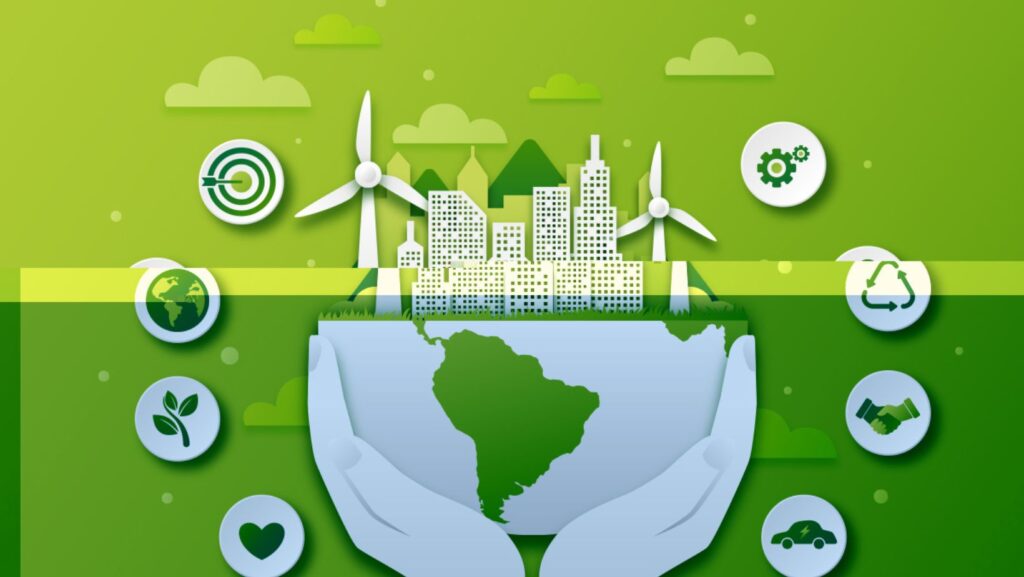Sustainable energy & fuels play a vital role in shaping our future by providing environmentally friendly alternatives to traditional sources of power. As the global demand for energy continues to rise, the need for sustainable solutions becomes increasingly urgent. From solar and wind power to biofuels and hydrogen, innovative technologies are paving the way for a more sustainable energy landscape.

When we talk about sustainable energy, we refer to resources that can be replenished naturally within a short period, such as sunlight or wind. These sources not only help reduce greenhouse gas emissions but also decrease our dependence on finite fossil fuels. Embracing sustainable energy options is not just an environmental choice; it’s a strategic decision that can lead to long-term benefits for both the planet and our society.
The transition to sustainable energy & fuels requires a concerted effort from individuals, businesses, and governments worldwide. By investing in renewable technologies and promoting energy efficiency practices, we can work towards a cleaner and more sustainable future. Join me as I delve deeper into the world of sustainable energy & fuels and explore the possibilities they offer for a greener tomorrow.
Sustainable Energy & Fuels
Hey there! Let’s dive into the fascinating world of sustainable energy and fuels. This field is all about finding innovative ways to power our lives while minimizing negative impacts on the environment. From solar and wind power to biofuels and hydrogen, sustainable energy sources are paving the way for a greener future.
Key Points:

- Diverse Sources: Sustainable energy encompasses a wide range of sources, including solar, wind, hydroelectric, biomass, geothermal, and more. Each source has its unique strengths and applications.
- Environmental Benefits: One of the primary advantages of sustainable energy is its minimal environmental footprint. Unlike traditional fossil fuels, renewable energy sources produce little to no greenhouse gas emissions or air pollutants.
- Technological Advancements: The rapid advancement of technology has made sustainable energy more efficient and cost-effective than ever before. Innovations in battery storage, smart grids, and renewable infrastructure are driving the transition towards cleaner energy solutions.
Here’s a snapshot of some key statistics related to sustainable energy:
| Statistics | Values |
| Global Renewable Energy Capacity | Over 2,500 GW by 2021 |
| Solar Energy Growth | Increased by 22% in 2020 |
| Wind Power Generation | Accounts for over 10% of global electricity demand |
As we move towards a more sustainable future, it’s essential to continue investing in research and development to unlock the full potential of clean energy technologies. By harnessing the power of nature responsibly, we can create a healthier planet for current and future generations.
Stay tuned as we explore further insights into the exciting realm of sustainable energy and fuels in the upcoming sections!
Importance of Sustainable Energy
In today’s world, the significance of sustainable energy cannot be overstated. As we face pressing environmental challenges like climate change and dwindling fossil fuel reserves, transitioning to sustainable energy sources is not just an option; it’s a necessity for our planet’s future well-being.

- Environmental Protection: Opting for sustainable energy helps reduce harmful emissions, such as greenhouse gases and pollutants, thus mitigating the impact of global warming.
- Resource Conservation: Utilizing renewable resources like solar, wind, and hydroelectric power ensures that we can meet our current needs without compromising the ability of future generations to meet their own.
Sustainable energy initiatives can also spur economic growth by creating new job opportunities in sectors like renewable energy production, distribution, and research. Investing in green technologies fosters innovation and positions countries at the forefront of the evolving energy landscape.
Global Relevance:

The importance of sustainable energy transcends borders. Collaborative efforts among nations are vital to achieving ambitious sustainability goals outlined in agreements like the Paris Climate Accord. By working together towards a shared vision of a greener future, we pave the way for a more resilient and harmonious world.
As individuals, communities, businesses, and governments increasingly recognize the critical role sustainable energy plays in shaping our collective destiny, embracing these clean alternatives becomes paramount. It’s not just about meeting our current needs; it’s about safeguarding the planet for generations to come.
When it comes to sustainable energy sources, the modern world is looking towards innovative solutions that can reduce our reliance on traditional fossil fuels. Let’s delve into some key types of sustainable energy sources that are shaping the future of energy production.
Solar Energy

Harnessing sunlight and converting it into electricity through photovoltaic cells is a primary example of sustainable energy. Solar panels installed on rooftops or in large solar farms capture sunlight and convert it into usable electricity without producing harmful emissions.
Wind turbines are another prominent source of clean energy. By capturing the kinetic energy from wind, these turbines generate electricity that can power homes, businesses, and even entire communities. Wind power is a rapidly growing sector in the renewable energy industry.
Hydropower utilizes the force of flowing water to generate electricity. Dams and reservoirs are built to control water flow, which spins turbines to produce power. It’s a reliable and established form of renewable energy with significant potential for expansion.
Biomass Energy
Biomass refers to organic materials like wood pellets, agricultural residues, or even municipal solid waste that can be burned or converted into biofuels for heat and electricity generation. Biomass energy helps reduce waste while providing a renewable alternative to fossil fuels.

Geothermal power taps into heat stored beneath the Earth’s surface. By harnessing steam or hot water from geothermal reservoirs, this form of sustainable energy produces electricity with minimal environmental impact compared to conventional power plants.
Incorporating a mix of these sustainable energy sources into our global energy portfolio holds promise for a cleaner and more sustainable future. Each plays a vital role in reducing carbon emissions and mitigating climate change effects.
Wind turbines are another prominent source of clean energy. By capturing the kinetic energy from wind, these turbines generate electricity that can power homes, businesses, and even entire communities. Wind power is a rapidly growing sector in the renewable energy industry.
Sustainable Fuels: An Overview
Exploring the realm of sustainable fuels opens up a landscape rich with promise and innovation. As we delve into this domain, it becomes evident that the shift towards renewable energy sources is not just a trend but a necessity for our planet’s future. Sustainable fuels encompass a diverse range of options that aim to reduce carbon emissions, enhance energy security, and promote environmental sustainability.
Key Points to Consider:

- Biofuels: Derived from organic matter such as plants and algae, biofuels offer a renewable alternative to traditional fossil fuels. They can be used in transportation, heating, and electricity generation.
- Hydrogen Fuel: Hydrogen has emerged as a versatile and clean fuel option that can power vehicles, heat buildings, and generate electricity without producing harmful emissions when produced using renewable energy sources.
- Synthetic Fuels: These fuels are produced through processes like Fischer-Tropsch synthesis or methanol production using captured carbon dioxide, offering a way to recycle CO2 emissions into useful energy products.
Statistical Insights:
| Type of Fuel | Energy Efficiency | Carbon Emission Reduction |
| Biofuels | 60-90% | Up to 90% |
| Hydrogen Fuel | 45-60% | Zero |
| Synthetic Fuels | Varies | Up to 100% |
As we witness advancements in sustainable fuel technologies worldwide, it is crucial to acknowledge the role each individual plays in supporting this transition. From policymakers implementing favorable regulations to consumers choosing eco-friendly options, collective efforts are vital for accelerating the adoption of sustainable fuels on a global scale.
Advances in Energy Storage Technologies
When it comes to sustainable energy solutions, the advancements in energy storage technologies play a crucial role in ensuring efficient utilization of renewable resources. Let’s delve into some key developments shaping this field:
1. Lithium-ion Batteries:
Lithium-ion batteries have revolutionized energy storage with their high energy density and longevity. These batteries are widely used in electric vehicles and grid-scale applications due to their reliability and rapid charge capabilities.

2. Solid-State Batteries:
The emergence of solid-state batteries represents a significant leap forward in energy storage technology. By replacing liquid electrolytes with solid alternatives, these batteries offer enhanced safety, higher energy density, and longer cycle life.
3. Flow Batteries:
Flow batteries are gaining traction for large-scale energy storage projects. With the ability to decouple power and capacity, they provide flexible and scalable solutions for storing excess renewable energy generated from sources like solar and wind.
4. Gravity-Based Storage:
Innovative concepts such as gravity-based storage systems are also being explored as sustainable energy storage options. These systems use mechanical or gravitational methods to store potential energy that can be converted back into electricity when needed.5. Artificial Intelligence Integration:
The integration of artificial intelligence (AI) algorithms is optimizing the performance of energy storage systems. AI enables predictive maintenance, real-time monitoring, and intelligent control strategies, maximizing efficiency and extending the lifespan of storage assets.
